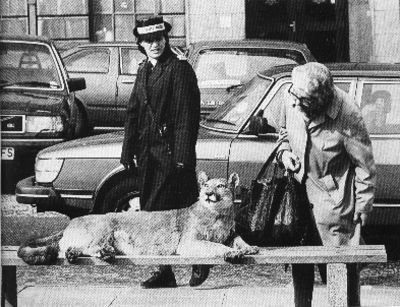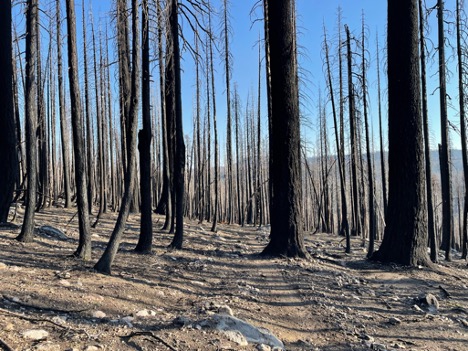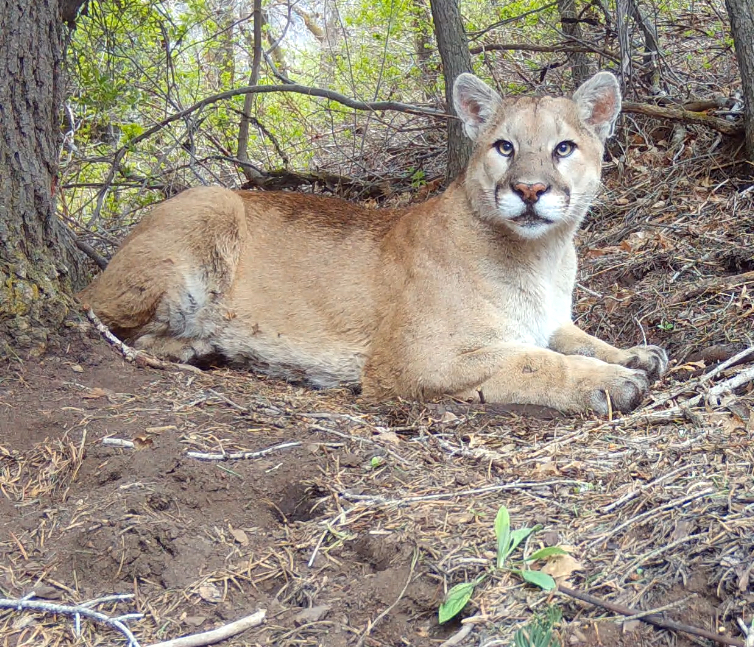Tom Forks is a Mountain Lion Foundation Coexistence Ambassador who lives in Mississippi, a state without a breeding population of cougars. We recently sat down with him to ask about sentiment towards mountain lions in eastern states and what makes eastern advocates some of the strongest voices for mountain lions.
Q: Mountain lions were extirpated from Mississippi more than a century ago. While dispersing males might occasionally walk through your state, cougars haven’t called Mississippi home for quite a while. What got you interested in mountain lions?
A: My father was a career Army officer and was often deployed. To pass the time and keep me out of trouble, my sister Cathy encouraged reading which led to a love of learning. My mom also encouraged my reading and always let me pick 5 or 6 books from the scholastic book club. I can still remember how excited I was to peruse the titles offered for sale. During my high school days, I discovered wonderful library books by Earnest Hemingway, Theodore Roosevelt, Jane Goodall and other authors and a series of books on hunting in Africa by Peter Hathaway Capstick which had a huge impact on my future education. I eagerly read each of his works, which led me to dream of becoming a game warden in Africa working with the “Big Cats.”
So, my interest in conservation in general and felines specifically started in high school. As life unfolded, I eventually studied biology in college, married my wife, and raised my son who is now grown with his own family. Although I still work, I now have more time to devote to my lifelong interests. Not too many years ago, on a camping trip to South Texas I stopped at a small grocery store on Highway 90 in southwest Texas to purchase soft drinks and ice. Pinned on the walls throughout the store were six or seven different photographs of a man posed with a lion he had shot at the behest of local ranchers near Big Bend, Texas.
When discussing the photographs with the proprietor, he nonchalantly said “that’s nothing.” He relayed that his brother had killed more than 140 lions over the preceding 10 years. That was a pivotal moment in my interest in mountain lion conservation! How a lion population with relatively low fecundity and high kitten mortality could sustain such a slaughter was beyond my comprehension. I think of that conversation quite frequently with great sadness. A few years ago, I learned of the Mountain Lion Foundation, and I proudly support their mission and mountain lion conservation. I am very proud to be a Mountain Lion Foundation Coexistence Ambassador.
Q: It would be ecologically beneficial for mountain lions to return to the eastern part of the United States. Do you think that your fellow Mississippians would welcome that return?
A: Mississippi is predominantly a rural state. We have 6 National Forests and over 19,250,000 acres (about the area of South Carolina) of forested land spread between public and private land owners. Our human population is approximately 2.9 million. We have over 1.75 million whitetail deer in Mississippi: the highest number of whitetail deer per acre in the country and second only to Texas in total number of white tail deer.
At my recent tabling event in Jackson, Mississippi I was very encouraged by the positive comments I received regarding the Mountain Lion Foundation. People were very supportive of the Mountain Lion Foundation’s mission. The response I received from attendees, albeit unscientific, certainly indicates a very healthy interest in mountain lions and I have no doubt most Mississippians would welcome their presence and would encourage the Mississippi Department of Wildlife, Fisheries and Parks to attempt to establish a breeding population of lions in Mississippi. As an aside, we now have, after years of absence, a population of about 200 black bears according to the Mississippi Department of Fisheries, Wildlife and Parks. The bears are strictly protected. We can do the same for lions.
Q: You table events in Mississippi for the Mountain Lion Foundation. What are the most common questions that people ask you as a cougar representative?
A: Do we have mountain lions here in Mississippi, and what is the purpose of the Mountain Lion Foundation?
Q: Earlier this summer (2024), Washington implemented new science-based rules to increase protections for their cougars. Colorado is poised to ban mountain lion trophy hunting in November. On the other hand, Utah continues to strip protections for their wild cats. And while Texas finally made canned hunts illegal this year, sport hunting of cougars remains unregulated. As someone who wants mountain lions to return to his state, what do you think about these legislative initiatives?
A: I am thrilled that Colorado appears to be poised to ban the trophy hunting of cougars. I’m hoping that other states will take notice and do likewise. I am of the opinion that all states should ban trophy hunting of mountain lions. My view is that there should be a moratorium on all hunting until adequate studies have been published in peer reviewed journals detailing population dynamics to include: cat density, reproduction rates, survival numbers to reproductive status, numbers killed by rodenticides, automobile strikes, wolves, coyotes, other carnivores, disease and illness, and legal and/or illegal hunting by humans. In those states that adequately manage their lion populations and allow hunting: hunting with dogs is just plain unsportsmanlike and should not be allowed.
Q: Have you seen a mountain lion in the wild? What was that experience like?
A. Yes, I have had the rare pleasure of seeing a mountain lion in the wild. One very early morning (approximately 0200) while returning to San Antonio, Texas from a camping trip near Harlingen, Texas I saw a mountain lion walking into a field from the right side of the road. Our headlights illuminated the cat for about 5-6 seconds before it vanished but what an incredible sight. I’m grateful to have had one I’ll never forget.
Q: Do you advocate for other wildlife that currently call Mississippi?
A: In addition to the Mountain Lion Foundation, I am a member of the Wildlife Society, Panthera, The Puma Fund, the Shark Research Institute, the Sea Turtle Preservation Society, Caretta Research Project, Ocean Conservancy, Coastal Conservation Association, The Rattlesnake Conservancy, The Asclepius Foundation and others. I am interested in these organizations, and I promote conservation and tolerance. I try to educate my fellow Mississippians about how important mountain lions, bobcats, sharks, snakes, turtles, etc., are to a healthy ecosystem. One of my very great concerns here in Mississippi is the use of rodenticides and their detrimental effects on pets and wildlife. I am also very concerned about the status of lynx in Mississippi, and I’m interested in an in-depth study of bobcat population dynamics.
Q: What advice would you give to other lion advocates living in states without breeding populations? What can people do right now to support the return of wild cats in their part of the country?
A: In those states without breeding populations of mountain lions I would suggest to advocate for the return of breeding populations to determine if:
- there is an interest in the populace to reintroduce lions
- the state has suitable habitat with wilderness corridors for dispersal
- the state has the economic means to build wildlife bridges to cross busy highways to mitigate injuries and lion deaths from car collisions
- the state has a suitable prey population for the lions to subsist on
- the state legislature will work with you to help reintroduce lions to your state
- the state’s wildlife agency is interested in helping you bring back lions.
In summary, the most effectual way to reintroduce lions in areas where they were extirpated is via science-based education and research, and a lot of hard work, patience, tolerance of opposing views and perseverance. Don’t give up, our lions need your help.



 Facebook
Facebook Twitter
Twitter Send Email
Send Email


